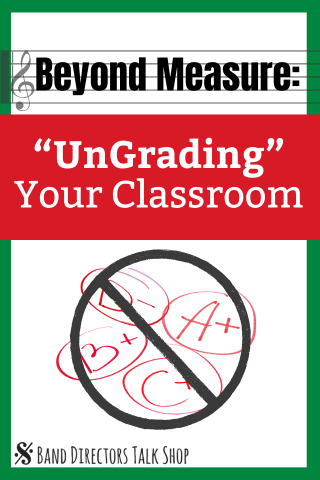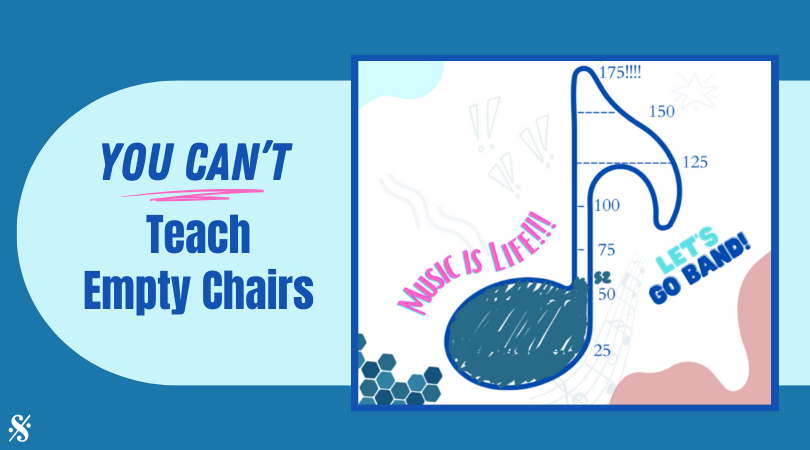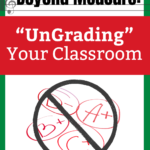“OK class, today is practice chart turn-in day.” Audible groans and murmurs came from the band. As I began collecting the monthly practice charts I noticed Spencer writing “20 minutes” in every box on the chart. I moved in on his position like a stealthy cougar, ready to pounce. With a triumphant “A-Ha!” I snatched his paper and told him to follow me into my office. I immediately picked up the phone and called his father. “Mr. Williams, I just witnessed your son filling out his practice chart and forging your signature.” With little hesitation, Mr. Williams responded, “No, I filled it out and signed it this morning.”
WAIT! WHAT? How could this be possible? The child was lying, and so was the father! My first instinct was to dock Spencer and his father ten points for committing a crime against musicianship. Instead, I took a long, hard look at what I was doing to create an environment where kids lied about practicing, and parents covered it up. I did research on the history of grading and learned how this biased, ineffective system of coercion, manipulation, and labeling has hurt our students and often prevented more authentic forms of assessment from taking root.

The Origins of a Failed System
The history of grading traces back to Adolphe Quetelet in 19th-century Belgium. Inspired by Sir Isaac Newton, Quetelet sought to apply systematic methods to understand and govern human behavior. He introduced the concept of the “Average Man,” derived from averaging psychological and physical measurements of thousands of individuals. Quetelet believed societal progress meant striving for this average under optimal conditions. This approach extended to the 1950s, with the US Air Force using averages to design a standard cockpit, despite no pilot fitting the dimensions. Frances Galton, a supporter of Quetelet, diverged on the idea of the Average Man as nature’s ideal, proposing eugenics in 1883. This notion, linked to genetic determinism, influenced figures like Carl Brigham, Lewis Terman, Edward Thorndike, and Frederick Winslow Taylor, perpetuating destructive and biased views in practices like standardized testing and scientific management that persist today, hindering the recognition of individual potential.
Ten Reasons to End Grading
- It diminishes students’ interest in whatever they’re learning.
- It creates a preference for the easiest possible task.
- It reduces the quality of students’ thinking.
- It traps learners into concentrating on “how” they are doing rather than on “what” they are doing.
- It tends to crush creativity.
- It crowds out good behavior and encourages unethical behavior.
- It fosters short-term thinking.
- One letter or number is Incapable of representing the complexities that it is meant to summarize.
- It creates competition and comparisons.
- It continues and potentially grows the bias “baked into” the system. Grades reward those who have resources, time, support, and prior knowledge. Grades often do not recognize and support students with fewer support systems and who have experienced more systemic barriers to academic success as well as more negative experiences with schools and other institutions of power.
The Seven Paradigm Shifts to Go Beyond Grading
Ungrading your classroom requires a shift in not just procedures and materials, but rather of mindset.
- Shift 1: “Grading Is Not Necessary For Learning But Feedback Is.” What students crave is information about something they are passionate about. Dump the labeling and create more opportunities for feedback.
- Shift 2: Assessment is not the same as “evaluation” but includes it. The assessment process requires you to gather (or notice) information/data, evaluate it by examining it, and then act upon it. Here’s the catch – the “act” doesn’t have to be assigning a grade! It might just mean that you decide to reteach the concept with a different strategy.
- Shift 3: Start with why. If you are creating an assessment start with defining the purpose of the assessment. What question are you hoping to answer?
- Shift 4: Who is assessing? Where the feedback originates is important. Do not underestimate the power of self-reflection and peer input beyond just your critique.
- Shift 5: It begins with quality teaching and curriculum. “One can have the best assessment imaginable, but unless the accompanying curriculum is of quality, the assessment has no use.” – Howard Gardner
- Shift 6: When to assess? We’ve heard a LOT about formative and summative, but how much do we consider diagnostic? Where are your students starting from? What unique skills and aptitudes do they possess? How can the learning be personalized to meet their individual needs?
- Shift 7: How to assess. I believe the secret to life (and assessment) is to pay attention. Notice, ask questions, be curious. Create opportunities for students to demonstrate learning in ways that speak to them as individuals. Provide the three keys to intrinsic motivation: autonomy, mastery, and purpose. Above all, ask good questions. The best teachers in my life asked me the best questions.
It is time to dismantle some historically bad practices regarding grading and replace them with equitable ideas that will transform not only the way you teach but also your relationships with your students. Students deserve better feedback, better questions, and more opportunities to demonstrate learning in a way that resonates with them. It is time to change the assessment paradigm, to go beyond measure, and to ungrade our classrooms.
Chris Gleason is the Arts and Creativity Consultant for the Wisconsin Department of Public Instruction. He is the 2017 Wisconsin Teacher of the Year and the first Wisconsin teacher to be named a National Teacher of the Year finalist in 50 years. He is the president and founder of Beyond The Notes Music Festival, Inc. and the ComMission Possible Project. His work at the state level has led to the creation of the Wisconsin Creativity Summit and Wisconsin Arts Celebration Project linking poets, composers, and arts educators in the creation of a unified work. He produces and co-hosts the podcast Beyond ArtLess. His 2019 TEDx Talk is entitled “Lighting A Fire In Kids: Three Insightful Teaching Truths.”
Related Reading:
What to Do When Band Kids Don’t Get It
One Thing That Improved Student Performance in Band (Well, Really 64 Things)
Teaching Strategies to Evaluate Band Students
If you would like to receive our weekly newsletter, sign up here.
Don’t forget to like us on Facebook too!
Learn. Share. Inspire.
BandDirectorsTalkShop.com






Leave a Reply
You must be logged in to post a comment.